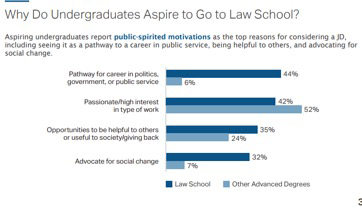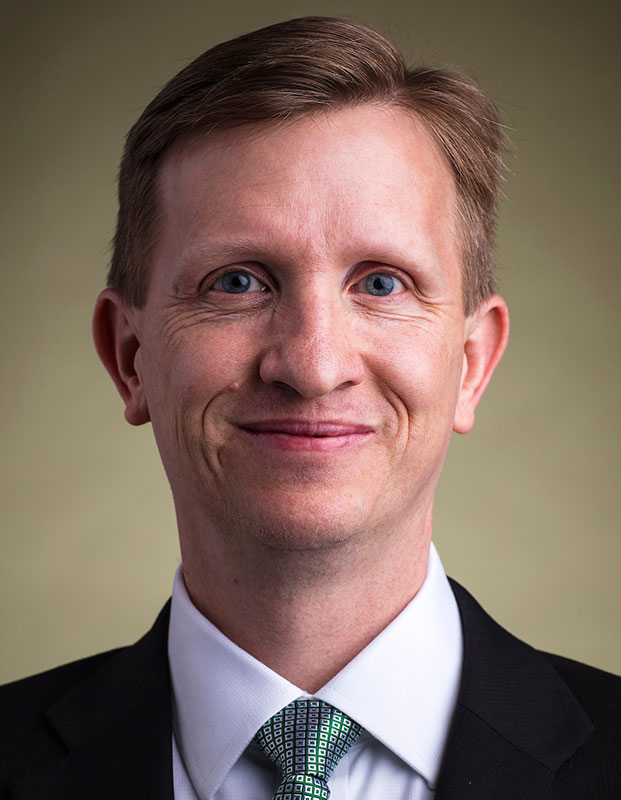Is surging interest in public-interest law behind the rise in law school applications?
A new report from the Association of American Law Schools (AALS) finds students today largely are choosing law school for public-spirited reasons, viewing the three-year professional degree as a pathway to a career in public service, politics, or government. Other top factors include being passionate about the work, an opportunity to give back to society, and to advocate for social change. The ability to qualify for a high-paying job and the prestige of being a lawyer both ranked lower on the list of 15 factors.

The September 2018 report is based on a 2017 survey of more than 22,000 college students and over 2,700 law students.
Some experts believe this strong interest in public service and social justice law is a factor behind the unexpected recovery in law school applications nationally in 2018 after the dramatic decline from 2010 to 2013, followed by four years of even lower, but steady, enrollment.
The Akron Law perspective
Professor Matthew Wilson, former dean of The University of Akron School of Law and former president of the University, agrees in part with this hypothesis. His view is that applications from people who were already certain they wanted to be lawyers probably never fell off that much. The big drop-off came from the larger segment that sees a law degree as a means of making a greater impact — but not as their only option.

Matthew Wilson
“I think a lot of this segment got scared off starting back around 2009 because many people were asserting that now is not the time to go law school, law school is not a good investment because you are going to rack up hundreds of thousands of dollars in debt without being able to quickly pay it back,” Wilson explained.
“Now, as things are cycling back, I think that segment of the population is coming back and seriously looking at law school,” he said. “And the discord we have in our society right now is another compelling reason for some people to invest in a legal education.”
So far, the shift portended by the AALS survey hasn’t manifested itself among the most recent Akron Law graduates. For the Class of 2017, 52 percent of graduates reported starting their career in private practice versus 17 percent in public interest/government. The figures were 53 percent and 20 percent, respectively, for the Class of 2016. The 20-percent range is typical for the law school over the longer term, said Alisa Benedict O’Brien, assistant dean for career services and strategic initiatives.
“Of course, the employment numbers only tell the story of where our grads have recently gone and who is hiring,” she added. “Our current student body may be more actively interested in public sector careers, and we may see these numbers shift.”
One Akron Law administrator on the front lines of recruiting is sensing some hints of change.
“I am seeing more environmental studies majors who are considering law school as opposed to grad school,” said Alecia Bencze, assistant director of career services and student advising. “I’ve had at least three in the last month contact me. None have directly said this is because of what’s happening with the EPA, but I didn’t really see that last year.”
Exploring opportunities
Wilson cautions that it is not unusual for students to come to law school with a certain motivation and then to change as they become aware of other opportunities. In a recent talk to prelaw students at Ohio University about intellectual property law, he had started off by asked how many were interested in doing IP law.
“Out of about 50 students, I had two hands go up,” Wilson said. “I’m thinking, why did they even show up? So, I went around the room trying to get a sense of what they were interested in doing. And public interest/social justice was a resonating theme. I tailored my presentation a little bit, but I went deep into IP law, because that is what they had asked me to talk about.
After his talk, Wilson said many students approached him, wanting to know more.
“They were saying, ‘I hadn’t realized that was the case; intellectual property is something I would definitely be interested in, in terms of law school.’
“For me, it was a microcosm of the transformation [that can happen in law school],” Wilson noted.
For more on what Akron Law is doing to better support students who want to pursue public interest or social justice lawyering, see: “New initiatives enhance law school’s social justice program.”
Media contact: Lisa Craig, 330-972-7429 or lmc91@uakron.edu.
